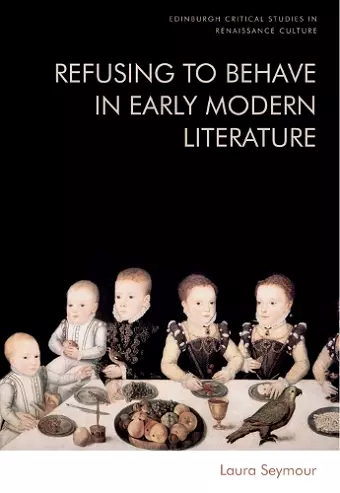Refusing to Behave in Early Modern Literature
Format:Hardback
Publisher:Edinburgh University Press
Published:29th Nov '22
Should be back in stock very soon

Examines the interrelation of the bodily and the textual in four early modern literary examples of bad behavior Broadens the scope of current understandings of early modern literature by identifying and analysing the significance of genre to representations of resistance to behavioural norms Brings together a variety of texts that are not usually considered side by side (Elizabethan and Jacobean devil plays, non-conformist life writing, picaresque prose), using this carefully-chosen mix of texts to explore social norms as a generic concern Provides a definitive study of texts lacking a substantial critical apparatus, like Grim the Collier of Croydon Comparatively analyses early modern Anglophone texts alongside Spanish picaresque prose thus opening out new avenues in comparative literary studies Refusing to Behave in Early Modern Literature explores texts shaped by collisions between the idiosyncrasies of individual bodyminds and the values of small communities such as religion, sect, social milieu, congregation and family. The book encompasses the period from the late sixteenth century to the early eighteenth century, examining early modern shrew and devil plays, picaresque and rogue literature, and Quaker life-writing. Refusing to Behave examines the ways in which Thomas Dekker, Thomas Ellwood, Mateo Alem n and his translator James Mabbe, and the anonymous author of Grim the Collier of Croydon use textual tricks to provoke bodily responses in readers, and also draw on readers' bodily experiences to enrich their textual descriptions. This study broadens the scope of current understandings of early modern literature by identifying and analysing the significance of genre to representations of resistance to behavioural norms.
"Seymour's brilliant book exfoliates texts to show how the kinaesthetic experience of the characters can be written to evoke the reader's kinaesthetic experience. Reading her reading makes us aware of the ways our body is involved in making meaning while we read. Her book is a model of how to incorporate research on embodied cognition into literary studies." -Amy Cook, Stony Brook University
ISBN: 9781474491808
Dimensions: unknown
Weight: unknown
128 pages